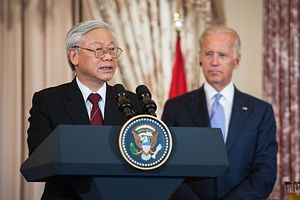Grass roots candidates ranging from activists to academics to performing artists all aim to compete in upcoming elections for Vietnam’s 500-member National Assembly, the communist country’s rubberstamp legislature. While some have suggested the unprecedented number of self-nominated independent candidates is reflective of political reforms enshrined in the 2013 constitution, the ruling Communist Party is not expected to cede significant control any time soon over the law-making body its card-carrying members have long dominated.
Nearly 100 self-nominated candidates in Hanoi, the national capital, and Ho Chi Minh City, the commercial hub, are vying to run in national legislative elections scheduled for May 22. Some have been surprisingly outspoken in the registration period about the need for change in Vietnam’s one-party authoritarian state, giving their preliminary campaigns an element of political protest. Foreign media reports have suggested the non-Party candidates, many of them in their 20s or 30s, are representative of a new generation more in-tune with a fast-changing society.
Vietnam has allowed for self-nominated candidates since 2002, but only a handful have actually been elected. That’s mainly because the Communist Party, rather than the population, controls the vetting of self-nominated candidates and often blocks potentially dissident independents from running on the official ballot. At least 83 candidates self-nominated themselves to run in the 2011 elections for the outgoing 13th National Assembly. Only 15, however, were actually included on the official ballot, of which a mere four were elected, according to a recent Radio Free Asia report.
Some analysts believe the Party may permit more self-appointees to run as a signal to the United States it is allowing for more political openness. U.S.-Vietnam relations entered an uncertain new period after the unexpected demise of outgoing Prime Minister Nguyen Tan Dung at the 12th Communist Party Congress held in January. Many had anticipated that the pro-U.S. Dung would become the Party’s next General Secretary, that his political allies would fill the government’s other top three positions, and that a Dung-led administration would draw Vietnam closer to the United States to counterbalance an increasingly assertive China.
Instead, Dung was outmaneuvered and forced into retirement, while the more pro-China Nguyen Phu Trong, 71, retained the Party’s all-powerful post beyond the mandatory retirement age. While the intra-party outcome was viewed generally as a setback for U.S.-Vietnam strategic relations, analysts are mixed on whether Hanoi’s new leadership will necessarily retard economic reforms, including liberalizing obligations required for membership to the pending Trans-Pacific Partnership, a U.S.-led multilateral trade pact. Experts predict Vietnam would benefit immensely in terms of future economic and export growth if the pact is enacted as envisioned.
Local activists had hoped that a U.S.-leaning, Dung-dominated government, goaded by pressure from Washington to implement TPP-related reforms, would eventually allow for more political openness – though Dung’s own record as a two-term prime minister was marred by chronic rights abuses. Others foresaw a scenario, similar to the transitional regime in Myanmar led by outgoing President Thein Sein, where Dung would have made democratic concessions to the United States, including the release of political prisoners and allowances for more free expression, in exchange for stronger strategic ties and the lifting of its lethal arms embargo.
Trong, who made a historic visit to Washington last July, is expected to maintain momentum behind TPP’s eventual implementation pending electoral politics in the United States, where the pact has become a whipping boy on both sides of the Democrat-Republican partisan divide (though many feel a Hillary Clinton administration would advance the pact if elected president.) Some suspect that Trong has tacitly backed the spectacle of self-nominated candidates campaigning and speaking relatively freely to provide U.S. President Barack Obama a good news democracy story to highlight during his scheduled visit to Hanoi in May.
The Party has simultaneously made clear that the electoral process and any other associated democratic spirits will remain tightly bottled. High-profile, self-nominated candidates have already reported instances of state harassment, including police interrogations, character assassination over state media and threats to reject their eligibility for minor mistakes in complex paperwork they must file with local authorities. Officials have also claimed that certain self-nominated candidates are being covertly financed by Viet Tan, an exile-run political party the government considers a terror organization due to its past insurgent history.
This week’s conviction and sentencing of two independent bloggers on charges of “abusing democratic freedoms” for their journalism underscored the lack of genuine democratic progress. Some activists had hoped recent releases of political prisoners, some before completion of their full sentences, others after fully serving their punitive terms, signaled a loosening that would be carried over to the high profile Ba Sam bloggers’ case. The U.S. embassy in Hanoi characterized the convictions and Vietnam’s continued use of criminal laws to stifle free speech as “disturbing”. So, too, is any honest assessment of the run-up to Vietnam’s latest faux legislative polls.

































